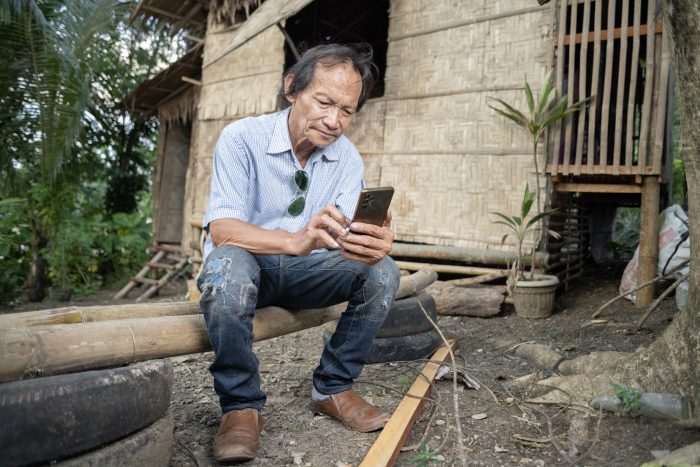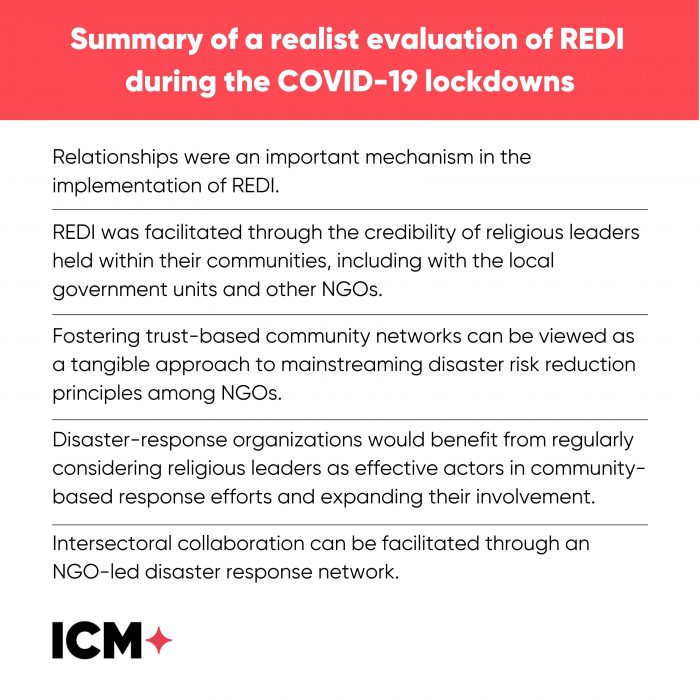A Realist Evaluation on the Role of Church Leaders in Relief Operations with NGOs published in International Journal of Disaster Risk Reduction

The study entitled “The contributions of religious leaders in addressing food insecurity during the COVID-19 pandemic in the Philippines: A realist evaluation of the Rapid Emergencies and Disasters Intervention (REDI)” has been published in the International Journal of Disaster Risk Reduction journal in February 2023. The team explores the role religious leaders played in addressing food insecurity during the COVID-19 pandemic in the Philippines.
Based on a series of interviews with pastors who participated in distributing food during the COVID-19 lockdowns, this study was conducted by International Care Ministries’ Director of Research Lincoln Lau, Research Associate Daryn Go, and National Metrics Officer Danilo Servano Jr. in partnership with Dalla Lana School of Public Health, University of Toronto and Laura Jane Brubacher and Warren Dodd of School of Public Health Sciences, University of Waterloo.
Working with or through faith leaders is strategically sound
“The value of this specific study to literature is to continue the discussion around the intersection between faith and humanitarian work,” said Lau.
This study contributes insight into how the unique position of religious leaders with communities, combined with organizational structures and guidance from a partner NGO, shapes the implementation of a disaster response initiative across resource-constrained communities. Furthermore, this study describes how collaboration between religious leaders, NGOs, and local governments can be facilitated through an NGO-led disaster response network.
Three main factors were identified in shaping effective food aid distribution by religious leaders: program infrastructure (e.g., technical and relational support from partner NGO), social infrastructure (e.g., social networks), and community infrastructure (e.g., community assets as well as a broader enabling environment).
The unintended consequences of the COVID-19 pandemic-related public health measures have severely impacted poverty-stricken communities. Income loss, mobility restrictions, and associated food insecurity have contributed to a humanitarian crisis in many parts of the world. Non-government organizations (NGOs) urgently worked to meet immediate needs, including addressing emergency food insecurity in resource-constrained communities.

Partner pastors and International Care Ministries
Among NGOs who responded is International Care Ministries (ICM), a faith-based non-profit organization in the Philippines. ICM provides community-based poverty alleviation and health promotion programs to households experiencing ultra-poverty in the Visayas and Mindanao.
During the pandemic lockdowns, ICM mobilized its thousands-strong network of volunteer pastors to distribute aid and relief goods in the communities that its staff are not able to reach due to the restrictions and road closures. (Read the study highlighting ICM’s unique response to the COVID-19 pandemic here.) The pastors kept in touch with the staff and relayed urgent requests for food along with news from their communities through ICM’s emergency response messaging hotline, REDI powered by Smart Infocast. The service allowed ICM to quickly respond to emergencies from families living in ultra-poor communities.
This collaboration has shown that program, social, and community infrastructures can shape effective food aid distribution. More than that, disaster-response organizations would benefit from tapping religious leaders and expanding their involvement as effective actors in community-based response efforts. Effective collaboration among religious leaders, NGOs, and government agencies will enable a more timely and effective disaster response.
Since March 2020, ICM has used REDI to assess community news and deliver food aid to over 1.2 million families, with approximately 15,000 pastors actively engaged in monitoring, reporting, and addressing local emergency food insecurity.
